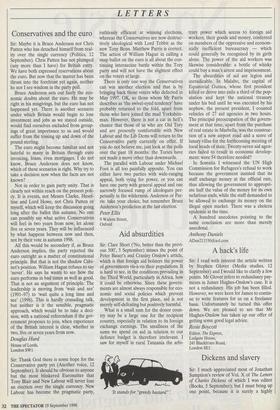Aid absurdities
Sir: Clare Short (`No, better than the previ- ous 500', 5 September) misses the point of Peter Bauer's and Cranley Onslow's article, which is that foreign aid bolsters the power of governments vis-à-vis their populations. It is hard to see, in the conditions prevailing in the Third World, particularly in Africa, how it could be otherwise. Since these govern- ments are almost always responsible for eco- nomic and social policies which prevent development in the first place, aid is not merely self-defeating but positively harmful.
What is a small sum for the donor coun- try may be a large one for the recipient country, especially in relation to its foreign exchange earnings. The smallness of the sums we spend on aid in relation to our defence budget is therefore irrelevant. I saw for myself in rural Tanzania the arbi- It stands for `greedy bastard" trary power which access to foreign aid workers, their goods and money, conferred on members of the oppressive and econom- ically inefficient bureaucracy — which could generally be recognised by its girth alone. The power of the aid workers was likewise considerable: a bottle of whisky could buy a man's arrest and imprisonment.
The absurdities of aid are legion and ineradicable. In Malabo, the capital of Equatorial Guinea, whose first president killed or drove into exile a third of the pop- ulation and kept the national treasury under his bed until he was executed by his nephew, the present president, I counted vehicles of 27 aid agencies in two hours. The principal preoccupation of the govern- ment at that time, apart from the purchase of real estate in Marbella, was the construc- tion of a new airport road and a score of luxury villas for the forthcoming meeting of local heads of state. Twenty-seven aid agen- cies failed to result in economic develop- ment: were 54 therefore needed?
In Somalia I witnessed the UN High Commission for Refugees's refusal to work because the government insisted that its staff exchange money at the official rate, thus allowing the government to appropri- ate half the value of the money for its own nefarious ends, while the staff demanded to be allowed to exchange its money on the illegal open market. There was a cholera epidemic at the time.
A hundred anecdotes pointing to the same conclusion are more than merely anecdotal.
Anthony Daniels
ADan211530@aol.com










































































 Previous page
Previous page